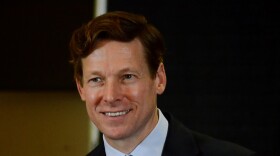In 2018, hundreds of students surrounded and then toppled the Confederate monument at UNC-Chapel Hill known as Silent Sam. While some saw it simply as a historical marker, many others believed it was a symbol of oppression tied to slavery and white supremacy.
The next year, the UNC Board of Governors said they agreed to a $2.5 million settlement with the Sons of Confederate Veterans to preserve it. That outraged some faculty and students, and a judge eventually invalidated it.
It was under all of these circumstances that UNC created the Commission on History, Race, and a Way Forward. And from Wednesday, March 15 to Saturday, March 18, the commission will host the 2023 edition of a free four-day conference about reckoning with and learning from the legacy of slavery.
WUNC's Will Michaels spoke with commission co-chairs Jim Leloudis and Patricia Parker about the turbulent moments when the commission started, and what UNC has to offer in a new discussion about slavery.
This conversation has been lightly edited for clarity and brevity.
WILL MICHAELS: UNC created the Commission on History, Race, and a Way Forward four years ago. That name itself sounds like a daunting task.
PATRICIA PARKER: For me personally, as a faculty member who's been on campus for a while, and as a Black woman, a Black faculty member very interested in the history of this place, it gave me pause to accept the chancellor's invitation to be the co-chair of the commission ... I made it very clear that if I'm going to be on a commission on history and race, that it would be an instrument of change and transformation, of healing for our campus, of doing some truth-telling about the history of race, racial slavery for example, and the dispossession of indigenous lands.
JIM LELOUDIS: It was also clear to us there in late 2019, early 2020, it was absolutely imperative to pick this work up and carry it forward in part because we are a public university. And we have an obligation to teach this history in a way that encourages reckoning, and as Pat said, healing, not only on this campus, but I think for the people of this state and in fact, for the people of this nation as well.
WILL MICHAELS: Part of the charge of the university Commission on History, Race, and A Way Forward is to report to the chancellor on how we as a university community must reckon with the past. What does reckoning mean in this context?
PARKER: So I'm thinking in particular about the descendants of the unsung laborers — enslaved people — who built this university. What does that reckoning look like in terms of reconciling those relationships that have never really been acknowledged? So part of our reckoning work has been engaging with members of the descendant communities, to have them tell their part of this history, which is the university's history.
MICHAELS: What do you hope that people come away with from this conference?
LELOUDIS: This is a little bit of an unusual conference in that it's not your traditional academic conference. It is not just a group of professors who are going to talk to one another about their research. But what has always been exciting about universities studying slavery is the way that it has brought multiple participants into the conference. So we will have undergraduate students in the conference, we will have alumni of the university in the conference, will have members of the descendent community in the conference, and each and every one of those groups is contributing in a vital way to the work of the commission.
MICHAELS: I always like to ask people what they've learned. And I wonder, just in the last four years that you've been a part of the Commission on History, Race and A Way Forward, what have you come to learn about "the way forward," what it looks like and where we go from here?
LELOUDIS: Wow, what a question. I suppose what I would say from a perspective as a professor, it's important to learn this lesson again, and again, and that lesson is humility. We in the professoriate don't possess the one true history. But there's so much to learn here in these conversations that Pat and I've been describing, particularly with descendant communities ... There's a great deal to be learned and understood by engaging people outside of the walls of the academy.
PARKER: Well, I think your question is absolutely valid since it's in the title of our commission ... and there is no one way forward. But one thing that was affirmed for me was the importance of taking the time to listen. Jim and I, we've had conversations with people who are descendent from the men whose names are on buildings that are being taken off [because their ancestors had ties to the Confederacy, white supremacy or both]. I'm not gonna share some of those private conversations, but some of my proudest work has been with one in particular of those descendants. Having these conversations of what it means for them personally in their families to reckon with this history, as a Black woman who was born and raised in the South and I'm a descendant of people who had been enslaved, this work lives in me. I am committed to this university's striving to do this work to reckon with this past and come out as a shining example of what it means to be human and to value human flourishing in every corner for every person.







